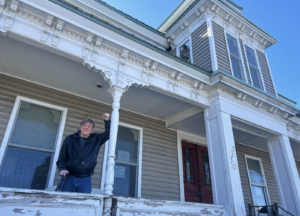The biggest myth surrounding sexual violence is that it has to do with sex. It doesn’t. It has to do with power.
Arianna Sessoms, a B.A. Graduate Assistant at UMaine’s Office of Sexual Assault & Violence Prevention, examined rape myths and their contribution to rape culture as part of last Wednesday’s Rape Culture Workshop. The event was part of a week long program titled “It’s On Us” which intends to raise awareness and educate students about sexual harassment, sexual violence, dating violence, domestic violence and stalking.
The workshop began by clearly outlining consent as “a clear, unambiguous and voluntary agreement to participate in sexual activity…it is not passive, it is not present if the person is asleep, unconscious, or mentally incapacitated due to drugs, alcohol, or other conditions… and it must be present even if there’s a longstanding relationship.” And, most importantly, “consent can be taken away at any time.”
Sessoms provided plenty of statistics to back up her stances on rape culture, highlighting that one in five women will be sexually assaulted by the time they finish college. For men, the statistics are one in 33. Men typically report sexual assault at an even lower rate than women, which can skew such statistics, but sexual violence remains a gendered crime.
Speaking about reporting, Sessoms argues that sexual assault is the most underreported crime there is, especially at universities.
Most sexual violence targets victims aged 12-34 and who are transgender are at the highest risk. The majority of victims know their attacker, or attackers and roughly 50 percent of incidents involve alcohol use.
Situations like these can make involving the police seem troublesome, which complicates some situations, since the University of Maine has a mandatory reporting system that requires all faculty (including student-workers) to report incidents of sexual assault or violence to law enforcement. This can cause some discomfort, as many argue that involving the police can lead to more strife for the victim. Statistically speaking, only three percent of rapists ever serve a day in jail.
So how do these statistics relate to rape culture and what is rape culture? Sessoms quoted Emilie Buchwald’s “Transforming Rape Culture” to define it as, “a complex set of beliefs that encourage male sexual aggression and supports violence against women.” The idea that rape is an unavoidable part of life and must be accepted is a major component of rape culture and Sessoms argues that sexual violence does not have to be the norm.
Components of rape culture that fuel its fire include jokes, victim-blaming, sexual conquesting, sexual scripts, rape myths and alcohol. Sessoms talked about how joking about rape occurs even at UMaine, where students may remark that they got “raped” by a particularly difficult exam or an 8 a.m. class. While it is hard to change your language framework to be more appropriate, it was stressed that students should always remember that while you may want to joke about rape, you should never imply that rape is a joke.
The workshop progressed to delving into to why rape culture exists, examining cultural norms as a framework for the environment of rape culture. Toxic masculinity, simplified as the rejection of anything feminine, hurts both men and women and contributes to male sexual aggression. Misogyny (the hatred of women), heteronormativity (the idea of heterosexuality as the norm), heteropatriarchy (the idea that society values men and heterosexuality over other sexual orientations) and slut-shaming (condemning women for enjoying sex) all intersect and come together in today’s culture to fuel an environment where sexual violence happens regularly.
An example of rape culture that most students encounter but may not realize on a day-to-day basis is how sexual objectification and violence intersect with language. When college students describe a sexual encounter, they might be tempted to exclaim “tap that,” “hit that,” “ride it,” “bang,” “screw,” “nail,” “plow,” “wreck,” “tear that s–t up,” or even “f–k.” All of these are example of how our modern day language conflates sex with violence. Take the common insult “motherf–ker,” for example. Sessoms explained how the term derives from the days of slavery when slave masters used to regularly rape slave women. Most people do not understand the connotations they use when their day-to-day language describes sex in terms of violence. But language can evolve and rape culture can be changed.
But progress is not always linear and one of Sessom’s final points took a political turn, for then-president elect Donald Trump’s infamous “grab her by the pussy” quote could not be overlooked when discussing rape culture.
Colonialism has always been a cornerstone of American culture, starting with the birth of our nation with the taking of Native Americans land, which included systematically raping Native women. Taking what you want is a staple of American culture and Trump’s admission of sexual assault is a prime example of that, according to Sessom. When examining Trump and his comments, one mustn’t overlook his wealth, race, sex, sexual orientation and social class, all of which contributed to voters overlooking these egregious comments and electing him President. White privilege often intersects with rape culture and can be seen recently in Trump’s case and the infamous Brock Turner rape scandal.
“Injustice anywhere is a threat to justice everywhere” is a common social justice phrase and is clearly relevant to dismantling rape culture. Rape culture coexists with transphobia, ageism, heterosexism, white supremacy, white privilege, racism, sexism, xenophobia, colonialism, homophobia and ableism — and to demolish rape culture, we must fight these battles as well.
So what can be done? How does each person make a difference in the culture of our country?
To get rid of rape culture, we must replace it with another and Sessoms believes the answer is something called “consent culture.” Defined by onlywithconsent.org as “a culture in which asking for consent is normalized and condoned in popular culture…we will live in a consent culture when we no longer objectify people and we value them as human beings.”
If consent culture had a motto it would be “open dialogue and mutual respect.” So talk about the issues of rape culture, support victims and survivors, don’t victim blame or shame, don’t tolerate rape jokes, educate others, challenge norms and stereotypes, help others in unsafe situations, respect boundaries and end all oppressions. As Sessoms herself says, “dismantle the oppressive establishment.”
Resources for students who have been sexually assaulted on campus include the Office of Sexual Assault & Violence Prevention (207-581-1406), the Office of Community Standards, Rights, & Responsibilities (207-581-1416), the UMaine Counseling Center (207-581-1392) and Cutler Health Center (207-581-4000).











